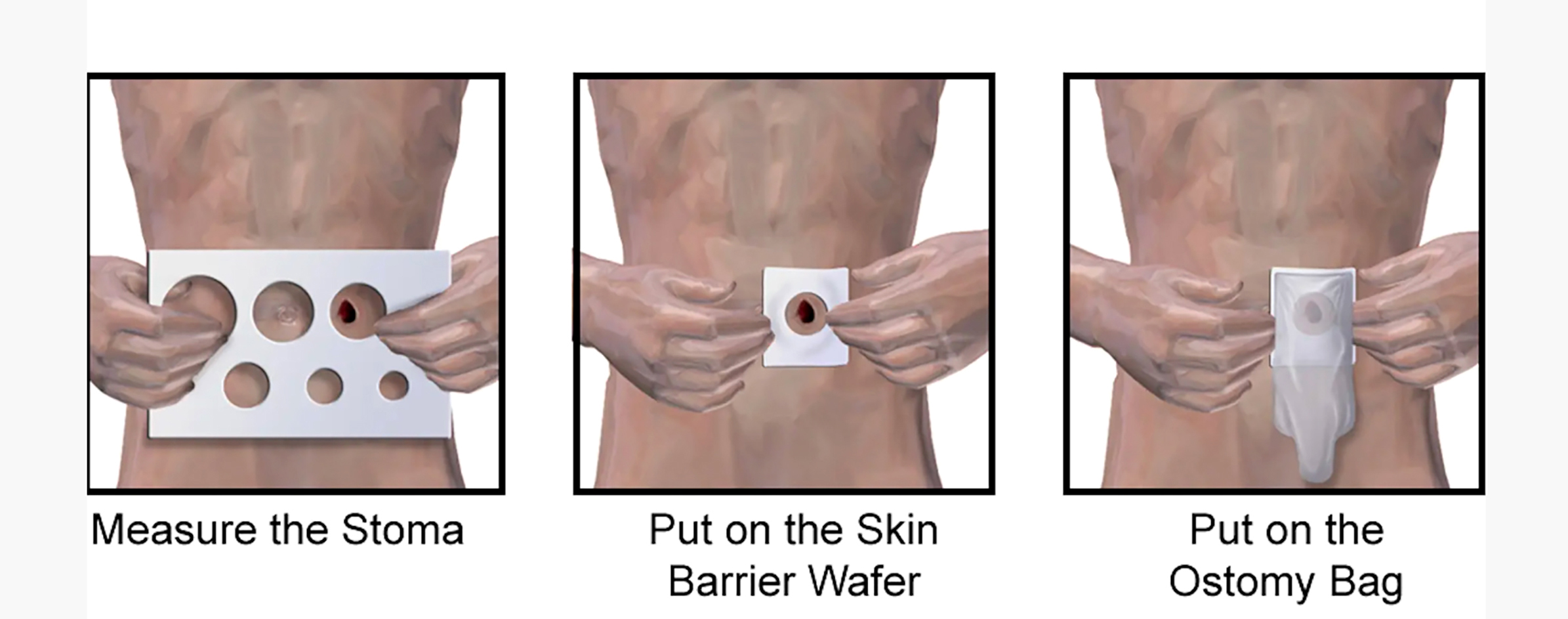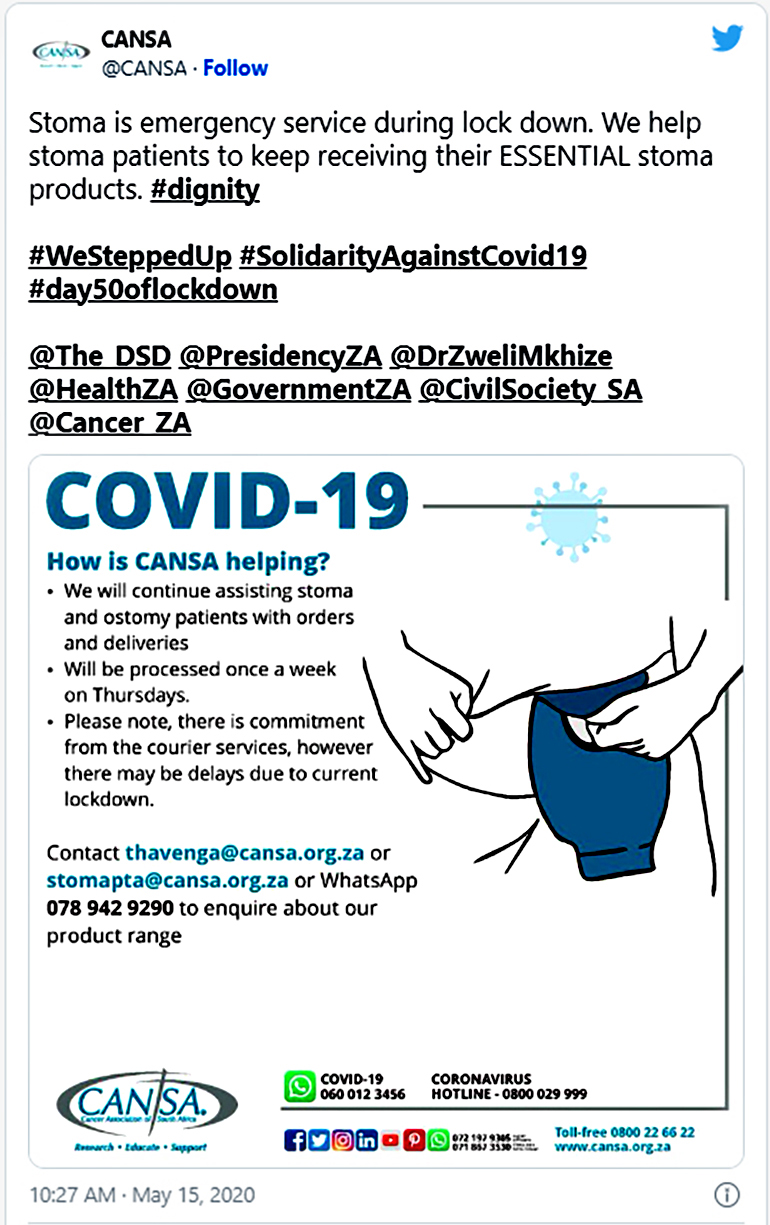SPOTLIGHT
Patients paid price of suffering and indignity as colostomy bags ran out at Gauteng hospital
Due to a convoluted procurement process, delays occur resulting in hospitals running out of the product. Furthermore, there are fewer than 100 nurses specialising in stomal therapy in South Africa and about 60,000 ostomates.
In 2017, Morris Ntamo underwent a colostomy at Chris Hani Baragwanath Hospital in Soweto. The surgery, which involves diverting a part of the colon through a surgically created opening in the stomach, likely saved Ntamo’s life.
After a colostomy, a person empties his or her bowels through the hole in the stomach (called a stoma) into a colostomy bag. In some cases, stomas can be reversed, and the colon reconnected. There are also types of stomas, for example, for the release of urine. (This NHS page has an accessible explainer of what a colostomy involves.)

A colostomy pouch. (Photo: Remedios44, CC BY-SA 4.0 / wikimedia.org / Spotlight)
After the surgery, Ntamo depended on the public healthcare system for a regular supply of appropriate colostomy bags. It went well until February this year when he says, he was told at the clinic that there was a shortage of bags. He was given only two for the month — previously he was given 20. When he returned to the clinic a month later, he says they only gave him five urostomy bags (bags meant for urine).
“I used to ask from those who had temporary stomas and had finished using the bags because the urostomy bags I was given at the clinic were leaking. They are not the same as colostomy bags,” says Ntamo.
“An ostomate’s (someone with a stoma) prescription cannot be changed and altered for another product in the event that his/her products are not available, and most certainly a bag meant for urine absolutely cannot be used for a stoma excreting stool and vice versa,” says Deidre (Dee) Waugh from the South African Stomaltherapy Association (Sasa).

(Image: Bruce Blaus, CC BY-SA 4.0 / wikimedia.org / Spotlight)
According to Waugh, every ostomate has their own unique needs and requirements based on factors like the type, shape, size, and site of the stoma, the output from the stoma (stool — thick, watery, porridgy or urine or in some cases both), the condition of the skin, and the person’s age, among others.
“Ostomates who are unable to obtain the appropriate pouching systems and relevant care have their dignity and right to live severely impacted,” says Waugh.
Besides leakage, which Waugh describes as “absolutely devastating for the ostomate”, other complications of using the wrong pouching systems or bags may include odour, peristomal skin complications such as excoriation (burnt skin), ulcers from pressure, and trauma to the stoma if the pouching system is too small. “The cost of diagnosing and treating these complications as a result of incorrect prescription or non-availability of products far exceeds the actual cost of an appropriate pouching system and care,” she says.

Faizel Jacobs, who has a permanent stoma after surgery for colorectal cancer, doesn’t mince his words when it comes to the impact of not having the right bags. He says toilets are seen as a basic human right. “But when an ostomate gets to a clinic, and they get told there’s no stock, come back later, or here are two bags to last for the month, that’s the equivalent of saying there’s no toilet for you. Our bags are our toilets and we take not having bags as a human rights violation.”
Government response
Speaking to Spotlight in June, the then Gauteng Health spokesperson Kwara Kekana admitted that there were shortages from March to June. Spotlight understands that since then the acute shortage of colostomy bags at the hospital has ended, although we haven’t been able to establish exactly when.
Responding to a question on whether it was the right option to give patients urostomy bags when there were no colostomy bags, Kekana told Spotlight, “We had no choice since we had already borrowed from Charlotte Maxeke and Helen Joseph. We tried to give them something instead of them going home with nothing.”
Kekana said that one of the reasons there were shortages at Chris Hani Baragwanath Hospital was that the hospital had to deal with an influx of patients from Charlotte Maxeke Academic Hospital, where there was a devastating fire in April 2021.
Visit Daily Maverick’s home page for more news, analysis and investigations
“During April and May 2022, Chris Hani Baragwanath received a number of patients from hospitals such as Thelle Mogoerane and Sebokeng, that also reported that they were sent back due to colostomy bags not being in stock. The patients then made their way to Chris Hani Baragwanath to collect colostomy bags. As a result, Chris Hani Baragwanath requested assistance from Charlotte Maxeke Academic Hospital and Helen Joseph to augment what they had in stock,” she said. “North West Province also sends their patients to the Stoma Clinic at Chris Hani Baragwanath to collect colostomy bags.”
However, the North West Department of Health denied this. “The North West Department of Health hospital CEOs have confirmed that there has not been an instance where any patient was referred to Gauteng hospitals merely to collect colostomy bags. Furthermore, the supply of colostomy bags has not been a challenge in North West to the point that required any outside assistance,” Tebogo Lekgethwane, the department’s spokesperson, told Spotlight.
Procurement issues
“The process within the hospital for procuring these (colostomy bags) is quite convoluted,” says Dave Dudley, who is also associated with Sasa and previously worked in the industry. “First, it goes through an RFQ (Request for Quotation). Then the procurement officers will look at who supplies this type of product, or sometimes they don’t because they don’t understand the urgency and the importance of ensuring continuity of supply.”
He says that the issue is getting the right product to the right individual in the right timeframes. But because of a convoluted procurement process, delays occur and then all of a sudden a hospital runs out of the product. “It is important to understand stoma care at the management level of a hospital and making sure [the] procurement department is aware of the challenges these individuals face,” he says.
“My concern is that the people who access these products in the private sector are well managed and well looked after. Why shouldn’t that be the same for people who access healthcare in the public sector, which is the majority of the population?” he asks.

Too few stoma nurses
Currently, there are fewer than 100 nurses specialising in stomal therapy in South Africa and about 60,000 ostomates. Sasa says that the Department of Health needs to sit up and take note of the plight of ostomates.
“They need to ensure that every hospital in the country where patients are undergoing this type of surgery has a fully functional stomal therapy department staffed by a registered nurse educated in the speciality of stomal therapy,” says Waugh.
This nurse, says Waugh, needs to be responsible for the clinical care of the ostomate and provide the minimum standard of care as laid down by Sasa (The referenced Minimum Standards of Care Pathway will be published in a couple of weeks).
“It is the stomal therapist’s responsibility to ensure that there is adequate availability and variety of stoma products and that he/she has correctly assessed the stoma and the ostomate and prescribed the appropriate system,” she adds.
“Nurses are reluctant to train in stomal therapy as there is no recognition by the South African Nursing Council and therefore no financial benefit. In addition, the very serious shortage of nurses is a contributing factor, as is budget constraints which results in stoma departments being shut down,” she says. “In some hospitals, nurses are seconded to work with ostomates with absolutely no training and knowledge. This impacts both the ostomate as well as the nurse who is forced to work in a position for which she is not trained.”
While some ostomy supply companies are providing nurses to render stomal therapy at some public hospitals, Waugh says that this is not ideal as they are not permanently based at the said hospitals, and of course, the product of choice will be the product their company sells. However, she says, this will ultimately compromise patient care, affect budgets, and is a short-term solution to this crisis.
Getting help
Meanwhile, Ntamo had gone down several avenues in search of a reliable supply of colostomy bags. Not getting anywhere by complaining at the hospital, he approached the Office of Health Standards Compliance. Still not getting anywhere, he approached Section27, who agreed to take on his case.
“Because of physical limitations caused by his advanced age and his financial status, he cannot afford to return to the clinic on a weekly basis to collect urostomy bags. Instead, he should be provided with enough colostomy bags to enable him to collect them once a month,” Section27 wrote in a letter to Chris Hani Baragwanath Hospital.
According to the letter, the quality of Ntamo’s life was severely undermined by the hospital’s inability to provide him with enough colostomy bags. He had resorted to using the few colostomy or urostomy bags provided, and limiting his intake of food to reduce the amount and frequency of his excretion.
Since then, things have improved. According to Ntamo, after the Section27 intervention, he now receives 10 bags a month, which is an increase on the two per month that he received at the peak of the crisis, but not yet back to the 20 he used to receive. He says that the new bags are of higher quality than the old ones. DM/MC
NOTE: Section27 is mentioned in this article. Spotlight is published by Section27 and the TAC, but is editorially independent — an independence that the editors guard jealously. Spotlight is a member of the South African Press Council.
This article was published by Spotlight – health journalism in the public interest.






















 Become an Insider
Become an Insider
Comments - Please login in order to comment.